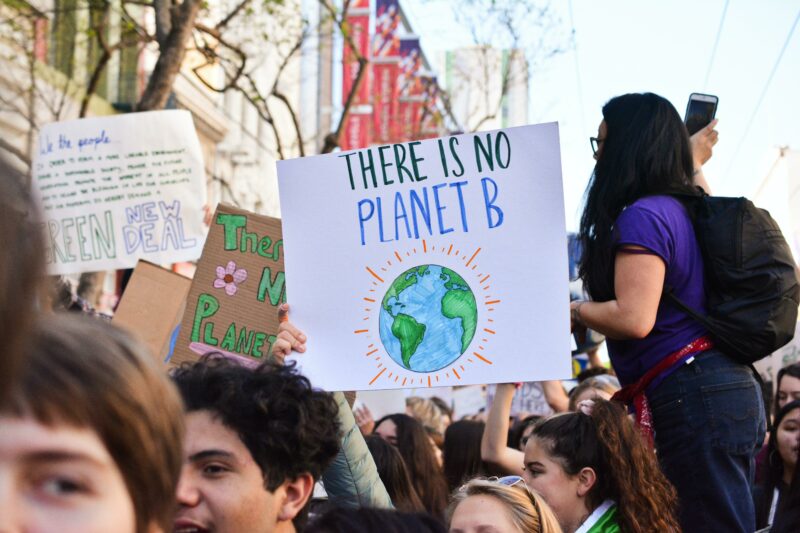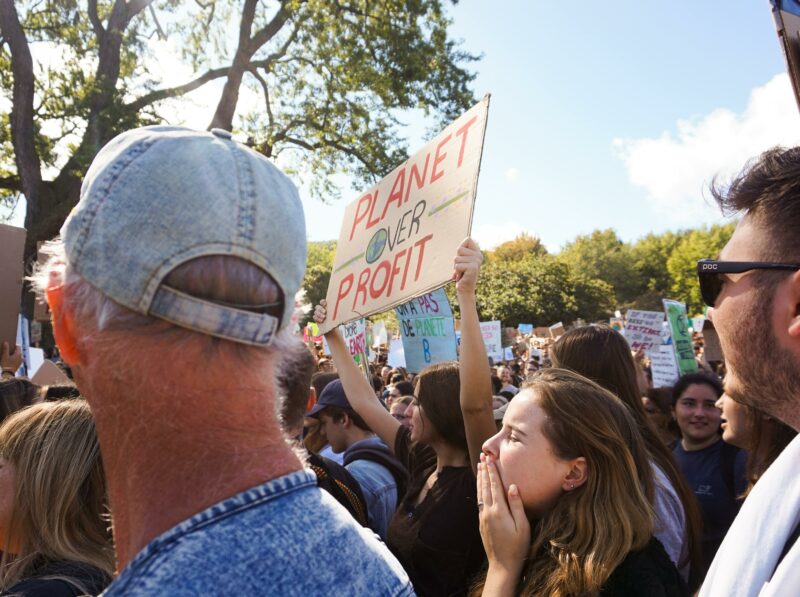How the youth climate movement has evolved from school strikes to systemic change
Our new research finds that young activists are become more radical as years of government inaction start to bite

New research published today by Climate Vanguard and the Green Economy Coalition finds that years of government inaction on climate change is radicalising an entire generation of young activists. Mapping the Global Youth Climate Movement: Towards a Green Economic Mandate marks the March 2023 youth climate strike and is based on a first-of-its-kind assessment of nearly 300 youth climate groups through stocktake, survey and interviews. The report finds a large and growing cohort of young activists, well over half those surveyed, who identify capitalism and colonialism as the root cause of climate breakdown.
And, far from being the preserve of Fridays for Future style polite protest – privileged, largely white middle-class young people in the Global North – the research finds that Sub-Saharan Africa is the most active continent for climate protest: a stark contrast to how youth climate action is portrayed in the media.
From school strikes to systemic change
Beginning in August 2018, a global campaign of youth climate strikes, parliamentary protests, and civic sit-ins re-ignited the fight against climate and ecological breakdown. Led and organised by teenagers, school students, and other young people, the youth climate movement (YCM) generated global headlines and made household names of its leaders.
Now, four years later, COVID-19, the invasion of Ukraine, and new administrations in the United States, Australia, Brazil and Germany (to name but a few) have fundamentally reshaped the global political order, all against a backdrop of intensifying climate disasters and unabated, state-subsidised fossil fuel profiteering.
“ The energy, creativity, and commitment of the YCM holds the power for radical transformation, but the movement remains desperately underfunded and needs support.”
While
school strikes are ongoing, the youth climate
movement has clearly
also changed shape. The number of school strikers has dwindled
and the movement has adopted new tactics, including
direct action: in January
this
year Greta
Thunberg
was arrested for participating in the blockade of an expanding coal mine in Lützerath,
Germany.
The start of 2023 thus represents an important moment to analyse the state of the YCM: its successes, failures, direction, and strategic priorities.
Mapping the Global Youth Climate Movement explores how the strategic vision of the YCM has evolved in response to the post-COVID world, and aims to contribute towards a better understanding of the YCM, both for those within the movement and those working in the climate and environmental policy space.1

A key finding is that the YCM is rapidly moving away from its initial strategic approach, centred around school strikes and protest marches, and its early core demand that policymakers “listen to the science.” Instead, the movement is now beginning to understand itself in a different way – with a more explicit emphasis on post-colonial, anti-capitalist analysis, and increasingly is calling for rapid structural transformation in our social, economic and political systems.
Over half of the surveyed YCM groups identified a “system that puts profit over people and planet” as the root cause of climate and ecological breakdown; 89% of this group specified the system as capitalism and (neo-)colonialism. The YCM is now directly engaging with the political-economic roots of this crisis.
As Noah Herfort, one of the young researchers behind the paper says, “Fully a quarter of groups surveyed want to replace the current economic system entirely, and this growing cohort of young people will not be satisfied by mere piecemeal reformist approaches to tackling climate change.”
“ The bonds between citizen and state are fraying, and this is especially true for young people who increasingly see themselves as marginalised by their own governments and betrayed by the economic choices of their elders”
A movement at the crossroads
Despite this, the report also finds that the YCM does not currently have a shared and coherent theory of change. This is largely explained by a limited understanding about how our political-economic system operates and how it reproduces itself. Consequently, a variety of visions emerge about the kind of change that YCM groups are fighting for. Additionally, some groups are overly wedded to fixed strategic doctrines that created the early success of the YCM.
Amidst this strategic divergence, the study did identify an emerging radical green economic wing in the YCM. These groups have a culture of strategic fluency and are escalating both demands and tactics in lockstep with the worsening planetary crisis. They are positioning themselves to uproot the drivers of Earth breakdown and build a new post-capitalist system that cares for both people and planet.

“The bonds between citizen and state are fraying, and this is especially true for young people who increasingly see themselves as marginalised by their own governments and betrayed by the economic choices of their elders,” says Jean McLean of the Green Economy Coalition.
The energy, creativity, and commitment of the YCM holds the power for radical transformation, but the movement remains desperately underfunded and needs support. The insights of this global mapping hopefully contribute towards a strengthened and invigorated YCM, enabling greater impact, coherent decision-making, and a deeper strategic engagement with levers of change.
As the report’s co-author Jack Johnson says, "With the necessary support, the YCM can develop a robust capacity to effectively engage with the political-economic roots of this crisis and build power towards a just, habitable world."


